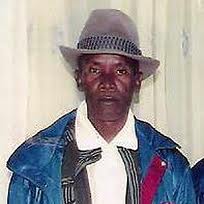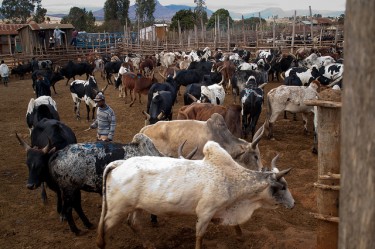This post is part of our International Relations & Security coverage.
Following the deaths of around a hundred people in southern Madagascar in clashes between zebu cattle rustlers (“dahalo”) and farmers, the government has decided to take special security measures to restore order. The violence is a symptom of the growing political instability in Madagascar that is affecting urban centers as well as rural communities.
People’s Justice in the South
Thefts and armed attacks are a recurring problem in Madagascar and have been growing more and more frequent since the political crisis in 2009. To overcome this problem, a national counter-instability plan [fr] was formally introduced in April 2012. The government has now mobilized the armed forces in the capital as well as in areas particularly affected by cattle theft.
However, initial attempts at stabilizing the southern region were far from successful. As Alain Rajaonarivony explains [fr]:
La campagne militaire menée dans le bush du grand Sud contre les Dahalo au mois de juin et juillet 2012 avait été un désastre. Outre l’avantage du terrain, ces derniers étaient aussi bien équipés que les forces de l’ordre, et le manque d’hélicos s’était fait cruellement ressentir. Les militaires se sont surtout fait remarquer, non pour leurs prouesses au combat mais pour leurs exactions, en brûlant les villages susceptibles de servir de base de soutien aux Dahalo.
The military campaign carried out against the dahalo in the bush of the great south in June and July 2012 was a disaster. Not only were they more familiar with the local terrain, the dahalo were also just as well equipped as the government forces – and the lack of helicopters was sorely felt by the latter. The government forces were especially noted not for their combat ability but for their atrocities, when they burnt villages that could serve as support bases for the dahalo.
Faced with the inability of government forces to curb the actions of dahalos, villagers in southern Madagascar have decided to take justice into their own hands. Recently, a group of villagers killed 67 people that they suspected of being involved in the cattle thefts.
Alain Iloniain on AllAfrica describes the additional security measures [fr] taken by the government following these tit-for-tat encounters, including mobilizing several elements of the armed forces in different parts of the country. However, before there can be order, it will be necessary to identify and apprehend and convict the dahalo. Citoyenne Malgache explains why this will not be an easy task [fr]:
Self-defense or not, the real question is who should we be defending ourselves against? As Dinan’Anosy mentioned, thieves are part of the community and are known to the population. But the thefts are often organized by underground smuggling networks. Those with large herds collaborate with the robbers one way or another to protect their own flock. And even if fokonolona is able to locate the stolen cattle, those who are then charged with having received them are quickly released. With the recent resumption – after 10 years of prohibition – of live cattle exports, you have to expect an increase in organized crime.

A portrait of Remenabila taken from a mock Twitter account created in his name: https://twitter.com/remenabila (with permission)
Widespread instability
The south is not the only region living under the specter of instability. Foreign embassies are alerting their expatriate nationals about thefts, physical attacks, robberies or even kidnappings. While many crimes seem to be targeted at foreigners, the criminals are not as easy to identify.
On Madagascar TV, Marc A. notes the surprising circumstances [fr] of one theft at Ivato airport where a Chinese national claimed 4,000 Euros were stolen from her luggage while she was frisked by security personnel. None of the guards were apprehended for the theft after a senior security official intervened.
The rest of the country has not been spared according to analysis on Afrik.com [fr]:
Il ne se passe pas une semaine sans que les journaux ne relatent des faits de violences dans la capitale Antananarivo. Toutes les couches de la population, des plus aisées aux plus modestes, sont victimes de ce fléau. Meurtres, agressions, vols à mains armés sont monnaie courante depuis trois ans, date de l’éclatement de la crise politique.
A week does not go by without more stories, in newspapers, about violence in the capital, Antananarivo. All segments of the population, from the most to the least privileged, are victims of this scourge. Murder, assault, armed robbery have been commonplace in the last three years.
So what answers might there be to this instability? Andry Rajoelina, President of the Transitional Authority since Madagascar’s former president was ousted in 2009, has made claims that the daholo problem in the south is an orchestrated attempt at political destabilization [fr]. Meanwhile, Mathieu Pellerin, a researcher at the French Institute for International Relations, believes that financial incentives take precedence over political interests:
While possession of a zebu is traditionally synonymous with power, zebu theft by politician-sponsored organized gangs is motivated by pecuniary interests arising from the resale and export of cattle.
 This post and its translations to Spanish, Arabic and French were commissioned by the International Security Network (ISN) as part of a partnership to seek out citizen voices on international relations and security issues worldwide. This post was first published on the ISN blog, see similar stories here.
This post and its translations to Spanish, Arabic and French were commissioned by the International Security Network (ISN) as part of a partnership to seek out citizen voices on international relations and security issues worldwide. This post was first published on the ISN blog, see similar stories here.








4 comments
I think the query for you is who should we be protecting ourselves against? As Diann described, criminals are aspect of the group and are known to the inhabitants. But the robberies are often structured by subterranean smuggling systems. Those with huge herds work together with the criminals one way or another to secure their own head…Thanks for sharing me…